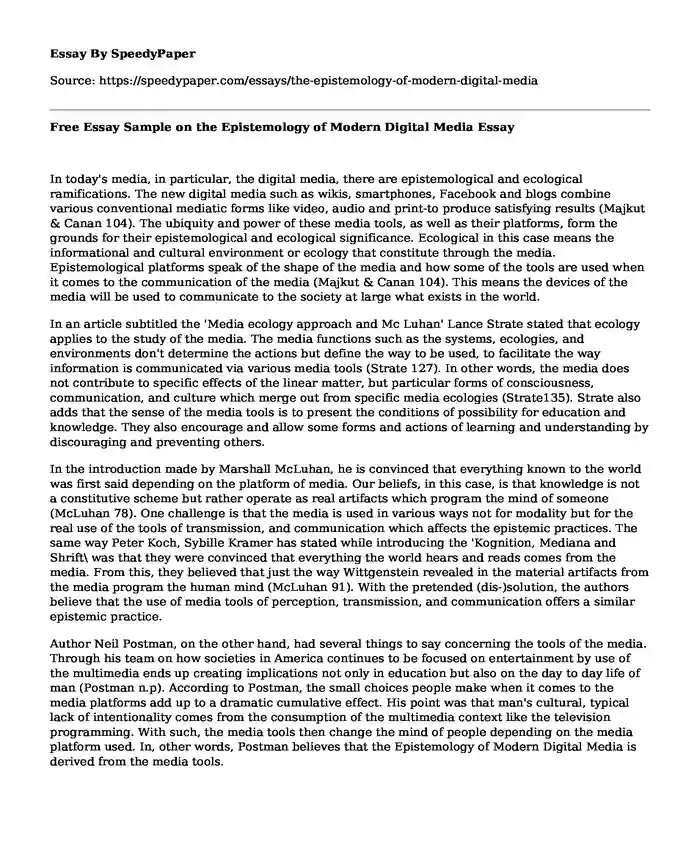In today's media, in particular, the digital media, there are epistemological and ecological ramifications. The new digital media such as wikis, smartphones, Facebook and blogs combine various conventional mediatic forms like video, audio and print-to produce satisfying results (Majkut & Canan 104). The ubiquity and power of these media tools, as well as their platforms, form the grounds for their epistemological and ecological significance. Ecological in this case means the informational and cultural environment or ecology that constitute through the media. Epistemological platforms speak of the shape of the media and how some of the tools are used when it comes to the communication of the media (Majkut & Canan 104). This means the devices of the media will be used to communicate to the society at large what exists in the world.
In an article subtitled the 'Media ecology approach and Mc Luhan' Lance Strate stated that ecology applies to the study of the media. The media functions such as the systems, ecologies, and environments don't determine the actions but define the way to be used, to facilitate the way information is communicated via various media tools (Strate 127). In other words, the media does not contribute to specific effects of the linear matter, but particular forms of consciousness, communication, and culture which merge out from specific media ecologies (Strate135). Strate also adds that the sense of the media tools is to present the conditions of possibility for education and knowledge. They also encourage and allow some forms and actions of learning and understanding by discouraging and preventing others.
In the introduction made by Marshall McLuhan, he is convinced that everything known to the world was first said depending on the platform of media. Our beliefs, in this case, is that knowledge is not a constitutive scheme but rather operate as real artifacts which program the mind of someone (McLuhan 78). One challenge is that the media is used in various ways not for modality but for the real use of the tools of transmission, and communication which affects the epistemic practices. The same way Peter Koch, Sybille Kramer has stated while introducing the 'Kognition, Mediana and Shrift\ was that they were convinced that everything the world hears and reads comes from the media. From this, they believed that just the way Wittgenstein revealed in the material artifacts from the media program the human mind (McLuhan 91). With the pretended (dis-)solution, the authors believe that the use of media tools of perception, transmission, and communication offers a similar epistemic practice.
Author Neil Postman, on the other hand, had several things to say concerning the tools of the media. Through his team on how societies in America continues to be focused on entertainment by use of the multimedia ends up creating implications not only in education but also on the day to day life of man (Postman n.p). According to Postman, the small choices people make when it comes to the media platforms add up to a dramatic cumulative effect. His point was that man's cultural, typical lack of intentionality comes from the consumption of the multimedia context like the television programming. With such, the media tools then change the mind of people depending on the media platform used. In, other words, Postman believes that the Epistemology of Modern Digital Media is derived from the media tools.
Works Cited
Majkut, Paul, and Canan Alberto Carrillo. Phenomenology and Media: an Anthology of Essays from Glimpse, Publication of the Society for Phenomenology and Media, 1999-2008. Zeta, 2010.
McLuhan, Eric, and Marshall McLuhan. Theories of Communication. Peter Lang, 2011.
Postman, Neil. Amusing Ourselves to Death: Public Discourse in the Age of Show Business. Simon Fraser University, 2007.
Strate, Lance. View of Studying Media as Media: McLuhan and the Media Ecology Approach, www.mediatropes.com/index.php/Mediatropes/article/view/3344/1488.
Cite this page
Free Essay Sample on the Epistemology of Modern Digital Media. (2022, Sep 21). Retrieved from https://speedypaper.net/essays/the-epistemology-of-modern-digital-media
Request Removal
If you are the original author of this essay and no longer wish to have it published on the SpeedyPaper website, please click below to request its removal:
- Essay Example: The Causes of Environmental Pollution
- Analysis of Nepalese Foods - Photo Essay Sample
- Applying Assessment and Health Education Skills, Free Essay Sample
- Heart of Darkness, Literary Analysis Essay Sample
- Personality Aspects of Entrepreneurship - Paper Sample for You
- Free Essay on an Ideal Classroom: Developing a Global Community of Open-Minded Individuals
- Essay Sample on Psychological Case Presentation: Agoraphobia in the Film Phobia
Popular categories





